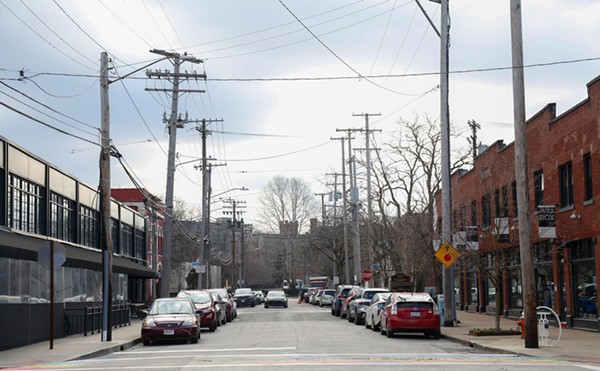Cleveland Municipal Court is having trouble obeying its own procedural rules — at least when it comes to Occupy Cleveland protesters.
Ten Occupy members are making their way through the court after being arrested in unison on the night of October 21. All were charged with the same $100 minor misdemeanors: curfew violations (for being on Public Square after 10 p.m.) and criminal trespassing (also for being on Public Square after hours). Nine were also charged with resisting arrest, a slightly more serious misdemeanor.
Court rules state that multiple people charged with the same crimes arising from the same incident will be assigned to the same judge and consolidated into one case for the sake of efficiency. But the 10 Occupy Cleveland cases have been divvied up between seven different judges, and the court's administrative judge, Ronald Adrine, denied a motion made by the protesters' attorneys to combine them into one.
The court is now scheduling 10 pretrial hearings that could lead to 10 one- or two-day trials with 10 juries and 10 sets of witnesses to be subpoenaed, each requiring the presence of a bailiff, court reporter, and city prosecutor, in addition to a judge.
"It's baffling that they would do this. Talk about wasting taxpayer money," says Terry Gilbert, a high-profile civil-rights attorney who is representing two of the accused. "Now we have these individuals in different courtrooms, with different lawyers and different judges who could be making 10 different rulings, creating virtual chaos and disparities in the outcome." He says that Judge Adrine denied the motion to consolidate the cases almost immediately and without explanation.
"Why were they even charged separately?" Gilbert asks. "I tried to talk to the prosecutor about it, and he was indifferent."
But the prosecutor's office drops the blame at the bench of Adrine.
"The city did not oppose the motion to consolidate the trials," says Cleveland Prosecutor Victor Perez.
When reached for comment by Scene, Judge Adrine responded by e-mail: "Each case was distinct, and there was no rationale for consolidating the cases, so each defendant will get his (or her) date in court," he wrote. "As for the cost, 99 percent of the cases on this level are settled before they go to trial. Out of 136,506 new cases in 2010, only 15 were settled by a jury trial."
But Cleveland's Occupiers are not likely to settle. "We are all committed to going to trial," says Leatrice Tolls, a group organizer and one of those arrested. "We were already offered a diversion program in exchange for having everything wiped clean, and we turned it down."
While taxpayers will foot the bill, the ordeal won't cost the protesters anything. Gilbert says that he and other lawyers representing the Occupy cases are doing it for free. Witnesses called to court might find themselves put out somewhat, however: Some of the same people are likely to be subpoenaed for all 10 cases, meaning they would need to take at least 10 days off of work to testify at the various trials.
Meanwhile, Occupy Cleveland continues its Public Square presence — and with the law on its side. Shortly after the October arrests, Occupy attorneys questioned in U.S. District Court whether the curfew ordinance was constitutional. According to mayoral spokesman Ken Silliman: "The city was strongly advised by the federal judge to issue a permanent permit for Occupy to [be on] Public Square."












